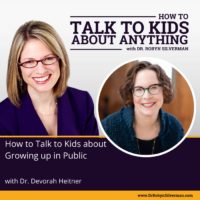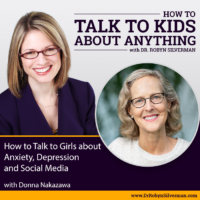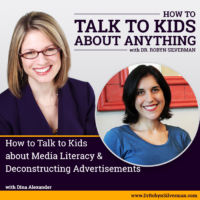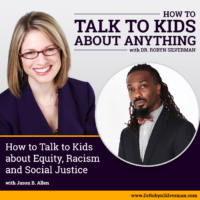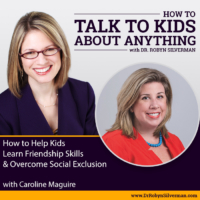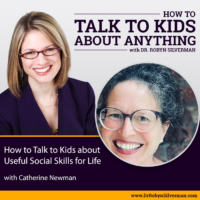Podcast: Play in new window | Download
Subscribe: Apple Podcasts | RSS | More
How to Talk to Kids about Instagram and Social Media
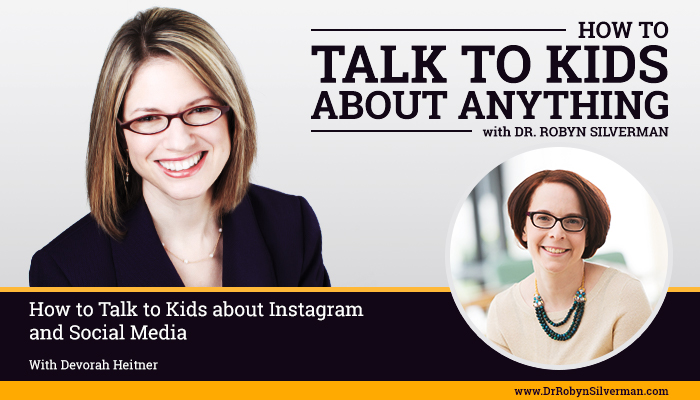
Today is a Talk to Kids Shortie—which we are having because it has been revealed that Instagram is worse for kids than we thought. And I know this really worries my listeners. Specifically- New documents reveal that Facebook knows just how harmful its Instagram app is for many tween and teen girls. The Wall street journal shared findings of what Instagram’s internal researchers called a “teen mental health deep dive,” including a study that found Instagram makes body image issues worse for 1 in 3 teen girls.
So we have on the fabulous Devorah Heitner on the show to shed some light on what’s going on, what we can do as parents and how we can talk to kids about the pitfalls of social media (and IG itself) so that they don’t fall victim to poor self esteem, poor body image and poor self worth.
Devorah Heitner has been on our podcast twice already and is the author of Screenwise—and the forthcoming book, Growing Up Public.
Important Messages:
- Instagram is life captured without the boring parts.
- Social medias- all about social comparison. Likes, comments, positive reaction.
- We need to ungamify social media with kids. Quality over quantity relationships!
- New to social media? Limit the number of apps (start with one!), limiting who you can follow and who can follow you (friends and family), limit time, learn the ropes.
- Social media is a performance. Highlight reel.
- Mentoring not monitoring or getting them off social media entirely.
- Talk about: the problems of social media and social comparison. Ask: Who are you following? Help them evaluate what kind of experience they are having so they can take their own emotional temperature. That is; when you scroll and look at this app, how do you feel? What’s your reaction? When you scroll another app, is it more neutral? Negative? Positive? Spend more time on the positive.
- They can curate the content in their feeds to protect their mental health. Certain sites- they are going to trigger the algorithm that brings more of that content to you. Diet influencer? More diet information. Child just getting in- only follow friends or family. If they are going to follow an influencer or celebrity- have the family conversation. Who is this person? If you tell the app that you are interested in this kind of person, you are asking it to give you more of the same kind of information. (If you follow Greta Thunberg, you’ll get more info about climate change). Think about what’s on the edges of what you are following- especially when you veer off friends and family. Steer away from the explore part of IG when you are new. Stick with small group of friends- different experience.
- If your child is interested in entrepreneurship, then that can be positive. Discuss it.
- Model it: Cultivate positive habits. When has social media and other screen pursuits been distracting? What can we do about it? (Maybe think about – Put in other room? Turn off at night? Cut off time?)
- Remind kids prioritize what you love- people you love- over social media. If you are just scrolling, you aren’t trying to get better at it. Who do you want to spend time with?
- Who are sharing with and what are you sharing- are you being overly vulnerable? Your inner most thoughts? Things that would make other people feel bad?
- Reality check what they see. Is this too good to be true? Let’s find out more- where are they getting this information? Is this accurate? Do they know what they are talking about?
- Everyone is posting for attention and validation. Promote business. Remind people of you. Show your character.
- Don’t say- why did you post this? Instead, talk about the universals. “We all want likes, we all want validation, we all want attention when we post. We all want to be perceived as funny or interesting or happy- or maybe we are looking for “pretty,” “beautiful,” etc.
- Is my child going after negative attention? Don’t meet that head on. Ask yourself; how can I meet this child’s need for attention and validation or help them find other outlets to meet those needs? (Intervene if it’s a major problem- Devorah interviewed a family with a child who was posting false information to get attention- like that her brother died in an accident).
- It can feel really bad to say “you need this attention so now I’ll give it to you.” You don’t need to provide your whole thought process. What would be healthy? Maybe they need to do a social project…maybe they need to play their instrument…
- Social media so rarely gives us what we want in terms of deep validation.
- Saying “I know more than you, and this is bad for you,” you may not get very far.
- Be honest about the culture. Make sure not toxic.
- Maybe look at positive body influencers instead.
- If child has risk factors- then limit to friends and family and look at time- use when feeling grounded. Or may not use it.
- ASK: What are the benefits or losses associated with taking a break from social media?
- Let them know: “There’s some negative messages out there and algorithms can make it so your feed is suddenly filled with negative messages.”
- Discuss the filter bubble- my internet is different than your internet. (Ted Talk) Eli Pariser https://www.ted.com/talks/eli_pariser_beware_online_filter_bubbles?language=en (Book) https://www.amazon.com/Filter-Bubble-Personalized-Changing-Think/dp/0143121235
- Say; “My internet is different from your internet because of the algorithms and you don’t want to trigger an algorithm that sends you harmful messages as a growing up person because we need to protect your growing up brain.”
- This is similar to the talk you’d have about porn or extreme violence. This is also on social media.
- Not just IG- Tik Tok has some real pernicious stuff- even pinterest can show porn. Just because you use it for knitting, doesn’t mean it can’t have bad stuff on it. Your experience of pinterest might be all about crafting but someone else’s might be very different.”
Notable Quotables:
- “Social media is all about social comparison– how many likes, comments or followers someone else has. As much as possible, we want to talk about ‘ungamifying’ social media, focusing on the quality relationships rather than the quantity.
- “Kids need to learn that social media is a performance—people are selling stuff, peddling information, trying to become influencers, or just trying to look like we have a life that’s interesting and fun.”
- Talk to kids about social media comparison, ask them who they are following and help them to evaluate the kind of experience they are having so they can take their own emotional temperature. How do they feel when they are on this social media app?”
- “We need to tell kids that they can curate the content in their feeds to protect their mental health.”
- “Remind kids to prioritize face to face contacts and hobbies they love over social media. What do they want to get better at- French? Gymnastics? Your instrument? Those are the things you want to prioritize as well as the friends that you really give you life and support you and make you happy.”
- “There are a lot of healthy ways to get attention in the world and be validated and seen—and social media so rarely gives us what we want on that front.”
- “We live in a culture that’s racist and misogynist and fat-phobic and we need to make sure we are not getting too many of these toxic messages in these social spaces.”
- “It’s not just Instagram- let’s not just throw Instagram under the bus. Tik Tok has some real pernicious stuff and even pinterest can show porn. Just because you might use that app for knitting advice, doesn’t mean it can’t have bad stuff on it. Your experience of pinterest might be all about crafting but someone else’s might be very different.”

